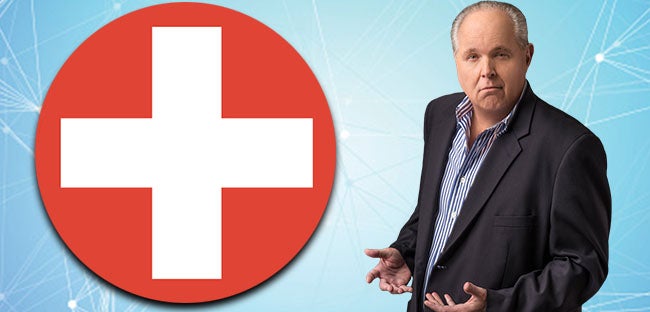RUSH: Here is Robert in Greenville, Tennessee. Great to have you on the program, Robert. How are you doing?
CALLER: Great to be here, Rush.
RUSH: Yeah. Have at it.
CALLER: Yeah, well, I have a direct-pay clinic in Greenville, Tennessee, that I’ve been running for the last 16 years, and I’ve calculated that we could save maybe up to a trillion dollars a year —
RUSH: What?
CALLER: — in savings through direct payment for routine medical care. And I sent this to all the Republican senators recently. So I hope that this gets out. It might seem far-fetched, but the letter details exactly how I come up with those numbers.
RUSH: By the way, we need to define terms here. Remember, for Rio Lindans, direct payment —
CALLER: Right.
RUSH: — means the patient walks in, gets treated, and pays you. There’s no insurance company.
BREAK TRANSCRIPT
RUSH: Back to Robert in Greenville, Tennessee. You’re exactly right, direct pay is where the patient just comes in, gets your service, and pays you, right?
CALLER: Right, right.
RUSH: There’s no middle man, there’s no government, there’s no insurance, and this is not catastrophic.
CALLER: Right.
RUSH: It would be both preventative and routine treatments, right?
 CALLER: Exactly. And so I have patients who purchased last year that are a lot less expensive than the hospitals. They’ll drive 30 miles to get a chest x-ray and save about a hundred dollars. They’ll get a colonoscopy at a place that’s about $3,000 less. I even had one patient go out to Oklahoma and get a surgery for about $10,000 less.
CALLER: Exactly. And so I have patients who purchased last year that are a lot less expensive than the hospitals. They’ll drive 30 miles to get a chest x-ray and save about a hundred dollars. They’ll get a colonoscopy at a place that’s about $3,000 less. I even had one patient go out to Oklahoma and get a surgery for about $10,000 less.
RUSH: Yeah, insurance companies are —
CALLER: It’s a network, it’s not just my practice, it’s a network of those who do direct payments.
RUSH: No, I know. I’ve talked to insurance agents who’ve tried to set things up like this, believe it or not, in Costa Rica —
CALLER: Yeah.
RUSH: — to evade American health care regulations. Your point is one of my bugaboos. The primary thing wrong, the primary, one of the foundational things wrong with American health care is it has no relationship to the market.
In virtually everything — there are exceptions. But in virtually everything else in terms of pricing and availability, market forces determine what something costs. And people that provide products and services have to produce, at prices people can afford in order to for the producer to make a profit and stay in business. It’s that simple.
My favorite example — I’m sorry for being redundant — is hotels. Regardless what your income, you can find a hotel room or a motel room to stay in. If you want to go five star and spend whatever those costs, they’re everywhere. If you don’t want to waste money like that and if you just want to spend something minuscule on nothing more than a bed and a roof, you can do that. The market provides choices for all desires and income potential. Same thing with airline travel, same thing with automobiles, same thing with iPhones, doesn’t matter.
But when we get to health care, there is none of that. There is no relationship between the patient’s ability to pay and what it costs. And it’s because interference began in the 1960s with the politicization of health care, which really intensified in the 1980s, with the Democrats essentially proposing that health care was a right, much like having a lawyer was a right if you couldn’t afford it.
And health savings accounts are the government’s way of trying to reintroduce market forces to health care. Catastrophic things are a whole different bailiwick. That’s where you do have insurance, you need it. Nobody’s expected to be able to pay what catastrophic injury or accident would cost. But normal every day tests trip to the doctor — by the way, if you go to the doctor with a headache, you shouldn’t have to get an MRI to see if you have a bad knee. Because of malpractice insurance. So there are a lot of things wrong.
I’ve been wondering, I think no matter what kind of health care, even if Obama had succeeded in single payer, guys like Robert here would have set up his own clinic and would have had to operate these things under the radar because there’s clearly a market for this. Anyway, Robert, I appreciate the call. I imagine people that don’t know his clinic in Greenville are now hearing about it. You’re gonna get blasted here, Robert, and have all kinds of people trying to find out who you are.


